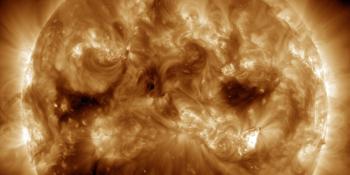Kp-index Help
NOAA SWPC Planetary K-index
This is the planetary K-index from the NOAA SWPC. This is a preliminary Kp-index that is updated every minute by the NOAA SWPC with an estimate of the measured Kp of the past 3 hours based on eight ground-based magnetometers around the world. This estimated 3-hour planetary Kp-index consists of 10 values and ranges from 0 to 9. It is important to understand that this Kp-index isn't a forecast or an indicator of the current conditions, it always shows the Kp-value that was observed during a certain period.
All times in UTC
GFZ Potsdam Quicklook Kp-index
This is the Quicklook Kp-index from the GFZ German Research Centre for Geosciences. This is a preliminary Kp-index which estimates the Kp-index in 3-hour periods. It is expressed in a scale of thirds and has 28 values.
All times in UTC
GFZ Potsdam Quicklook Geomagnetic ap-index
The ap index is a 3-hourly "equivalent amplitude" index expressing the range of disturbance in the horizontal components and is directly related to the Kp index. Each day the Ap index will be determined by averaging the eight values of ap for each day. The A-index was invented because there was a need to derive some kind of daily average level for geomagnetic activity. Because of the non-linear relationship of the K-scale to magnetometer fluctuations, it is not meaningful to take averages of a set of K indices
All times in UTC
Latest news
Latest forum messages
Support SpaceWeatherLive.com!
A lot of people come to SpaceWeatherLive to follow the Sun's activity or if there is aurora to be seen, but with more traffic comes higher server costs. Consider a donation if you enjoy SpaceWeatherLive so we can keep the website online!

Space weather facts
| Last X-flare | 2025/03/28 | X1.1 |
| Last M-flare | 2025/04/14 | M4.2 |
| Last geomagnetic storm | 2025/04/06 | Kp5 (G1) |
| Spotless days | |
|---|---|
| Last spotless day | 2022/06/08 |
| Monthly mean Sunspot Number | |
|---|---|
| March 2025 | 134.2 -20.4 |
| April 2025 | 132.1 -2.1 |
| Last 30 days | 130.6 -13.6 |


